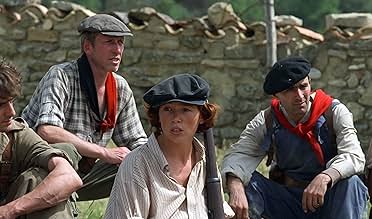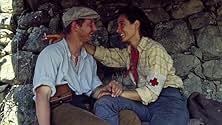Land and Freedom
- 1995
- Tous publics
- 1h 49m
David is an unemployed communist that comes to Spain in 1937 during the civil war to enroll the republicans and defend the democracy against the fascists. He makes friends between the soldie... Read allDavid is an unemployed communist that comes to Spain in 1937 during the civil war to enroll the republicans and defend the democracy against the fascists. He makes friends between the soldiers.David is an unemployed communist that comes to Spain in 1937 during the civil war to enroll the republicans and defend the democracy against the fascists. He makes friends between the soldiers.
- Nominated for 1 BAFTA Award
- 8 wins & 5 nominations total
- Maite
- (as Iciar Bollain)
- Juan Vidal
- (as Marc Martinez)
- Bernard Goujon
- (as Frederic Pierrot)
- Militia member
- (as Andres Aladren)
- Militia member
- (as Roca)
- Militia member
- (as Emili Samper)
- Director
- Writer
- All cast & crew
- Production, box office & more at IMDbPro
Featured reviews
It's a wonderful, intense, realistic and insightful look at the Spanish Civil War with the highly naturalistic cinematography and committed performances characteristic of Loach.
The reviews and debate concentrate on the action in Spain, which, for me, is only half the story that Loach is telling. I grew up in Liverpool in the 50's and 60's and knew quite a few David Carrs. Men then in their own fifties and sixties, often alone, keeping themselves to themselves in quiet corners of pubs and working men's clubs. They never told their own stories, never wanted credit, never wanted to relive their experiences in the Battle of the Atlantic, on the Baltic convoys, in North Africa. Someone who knew them would sometimes say "he was torpedoed four times" or "he was two years in Spain fighting Franco" and that would be that.
So I am delighted that David Carr, played by the incomparable Ian Hart, and this movie is such a fabulous testament to all of them. I love the way his life expands onto the screen, from the small remainder in a Liverpool council flat, from the letters uncovered by his death, into the light and air of Spain, enabling us to share in his buried idealism, its betrayal, then to witness the love of his life and the loss of it. Incredibly beautiful and truly heartbreaking. Unsuspected by all but his best mates and his newly enlightened granddaughter, David is surely off to Valhalla to be reunited with Blanca and his warrior friends of the past. I cannot think of anything in film so unsentimental yet so poignantly moving as her last salute.
This isn't Don Quixote, though. Nor is it Orwell, who is magnificent in an entirely different way, nor is it Hemingway's brash heroism or Saving Private Ryan's gung-ho bullet-for-bullet style of "historical verisimilitude".
It doesn't matter at all whether the events are being portrayed with strict accuracy or not. This is the authentic texture of twentieth century history in perfect context, portrayed through the lens of one man's experience.
And there is hardly anything else like it on film.
A true masterpiece of the art which deserves a much bigger reputation and a place in the British Movie Pantheon alongside the very best.
This interesting historical story is a passionate retelling and a touching warlike drama. The film originated an intense discussion in Spain about its principal theme , the Spanish Civil War . However the intense debate about ownership of lands proceeded in pseudo-documentary style is overlong and dull. Adequate cinematography by Barry Ackroyd , Ken Loach's usual . Perceptible and sensible musical score by George Fenton. ¨Land and freedom ¨ was a Spanish- British co-production and obtained much success in the Spain box-office . The film belongs a splendid trilogy by Ken Loach, developing historical deeds from a thoughtful point of sight , such as ¨Hidden agenda¨ and ¨The wind that shakes the barley¨.
The motion picture is professionally directed by Ken Loach. In the 90s he directed a series of award-winning movies firmly establishing him as one of the best European filmmakers with ¨Riff-Raff¨, ¨Raining stones¨ and ¨My name is Joe¨ winning several prizes in Cannes, and of course ¨Land and freedom¨ which achieved the Ecumenical Prize and the International critics Prize at the 1995 Cannes Film Festival. In the 2000s, Loach went on his special landmark about socialist realism with ¨Bread and Roses¨, ¨The Navigators¨, ¨Sweet sixteen¨, ¨Just a kiss¨, and ¨It's free world¨. This rich human drama appeal to Ken Loach enthusiasts and history buffs.
Truthfully I could care less about the politics of this tragic episode in world history, BUT the director,by his sheer genius & craftsmanship made me sit at the edge of my seat & pay close attention. Subtitles are used sparingly & it is hard to make some of the dialogue out due thick accent, The acting is so skillfull you needed no dialogue,you are able to understand each actors feelings & emotions. Credit this to Mr.Loach, The only actor I have heard of in this film is the lead IAN HART/ He & all the others do an excellent job. This film was made in 1995, & barely released,another example of distributors not knowing a GREAT film from a hole in the ground. Even this is a war film, there is very little violence, a good history lesson for the younger ones, then a trip to the library to find out more.
My rating is ***1/2 95/100 points 9 on IMDb
A left-wing lad goes to Spain, joins the otherwise totally obscure Marxist POUM militia, and experiences at first hand serious political differences with the Communists and their competing militia. Well, the lad does not actually get wounded in the throat during the course of the movie, but otherwise this is the biography of Eric Blair (George Orwell), as described in his book "Homage to Catalonia".
In spite of the single source cribbing, I did like this film in general since films about Spain in English, other than Canadian ones with Donald Sutherland as Dr. Norman Bethune, are few and far between.
It was wonderful to see a priest being shot in this film -- I don't mean it that way! -- since anti-clericalism was an important element both in the Spanish Civil War and in the French Revolution although it rarely seems to be mentioned much in the English-speaking world. The people in both countries felt the burden of traditional, oppressive, hypocritical Catholicism, just like the kind we had here in the Province of Quebec before the Quiet Revolution of the 1960's. At the other end of the political scale, the poor treatment of priests in Spain was a motivating force for Fascists in France to join the Charlemagne division of the Waffen SS to defend the cause of Christianity, or so The Sorrow and the Pity attests.
The Spanish war was about liberation from autocracy amidst a blizzard of competing, doctrinaire, left political philosophies. That was a really exciting time to be politically active, and there is a great scene of grassroots socialism in action at a town meeting.
The film has a rough-hewn, half-finished look characteristic of Ken Loach, but don't let that put you off. Anyone who can get worked up about the sometimes microscopic, casuistical differences between the Grits and the Tories, or the Democrats and the GOP, or New Labour and those other Tories, or Labor and National, or the SDP and the CDU, etc. should really love a movie, and a conflict, where the political spectrum is so broad for a change. Political animals of whatever bent should get a kick out of it.
Did you know
- TriviaAccording to Ken Loach, the debate in the village was the key scene in the film. He had local residents from the village play crowd members in that meeting.
- GoofsActually the rucksacks are the same as British 1908 pattern, and were made from 1929 onwards by La Industria Lonera in Barcelona, Spain.
- Quotes
[last lines]
Kim, David's granddaughter: The other day I found this. It was amongst my granddad's papers, and I just thought it was, like, fitting for him. It's a poem by William Morris, and I'd just like to read it out: "Join in the battle, wherein no man can fail. For whoso fadeth and dieth, yet his deeds shall still prevail."
- Crazy creditsSpecial thanks to the people of Mirambel and Morella.
- ConnectionsEdited from Caudillo (1977)
- SoundtracksA Las Barricades
Courtesy of Confederación de Nacional dl Trabajo
- How long is Land and Freedom?Powered by Alexa
Details
- Release date
- Countries of origin
- Languages
- Also known as
- Tierra y libertad
- Filming locations
- Production companies
- See more company credits at IMDbPro
Box office
- Budget
- £2,500,000 (estimated)
- Gross US & Canada
- $228,800
- Opening weekend US & Canada
- $8,144
- Mar 17, 1996
- Gross worldwide
- $228,800
- Runtime
- 1h 49m(109 min)
- Color
- Sound mix
- Aspect ratio
- 1.66 : 1
































